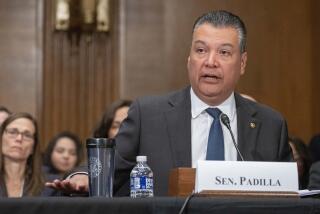Guarding Fannie Mae and Freddie Mac
- Share via
The massive bailout of the savings and loan industry has made some members of Congress skittish about other potential drains on the Treasury. To protect against even a hint of that possibility for government-backed mortgages, House Banking Committee Chairman Henry Gonzalez (D-Tex.) has sponsored legislation to reform the Federal National Mortgage Assn. and the Federal Home Loan Mortgage Corp. The bill also calls for greater federal support for affordable housing.
Neither Fannie Mae nor Freddie Mac, as they are popularly known, is in any danger of failing. Both agencies are considered financially sound. But their combined $800 billion in mortgage-related liabilities represents a great deal of risk, which is what inspired this legislation.
The bill would increase regulatory oversight and toughen capital standards. It would also ask the quasi-government agencies to do more to meet the growing housing needs of working-class and poor families.
The bill directs substantial new investment to the low, and least profitable, end of the housing market. It sets a goal of $3.5 billion for low- and very-low-income households during the next two years.
More than half of that investment would target home ownership and rentals for working-class and low-income Americans who earn no more than 60% of an area’s median income. The remainder would be directed to projects for those who earn no more than 80% of median income. The targeting would put money where the need is great and would compensate in part for the decline in traditional federal housing programs.
Fannie Mae is already in the low-income housing business, with a three-year, $10-billion commitment to a broad spectrum of special housing needs, including those of elderly, rural or first-time home buyers. It is also the largest corporate investor in the Local Initiatives Support Corp. (LISC), a nonprofit, affordable-housing advocate that seeks corporate investment to leverage low-income housing tax credits.
Freddie Mac is also a major player in affordable housing, with a $100-million commitment to buy long-term, fixed-rate mortgage loans on low-income rental housing and with a $10-million pledge to LISC.
The legislation, which is expected to come before the House by Sept. 15, would require both Fannie Mae and Freddie Mac to aggressively direct more of the capital they attract to affordable housing at no additional cost to the Treasury.
The Gonzalez bill would help to create houses that working-class Americans could own and apartments that poor families could afford. The legislation would also protect the taxpayers--already unhappily paying for bum deals conjured up by greedy S&L; executives--from possibly having to pay for another bailout. It’s worth supporting.
More to Read
Get the L.A. Times Politics newsletter
Deeply reported insights into legislation, politics and policy from Sacramento, Washington and beyond. In your inbox twice per week.
You may occasionally receive promotional content from the Los Angeles Times.










